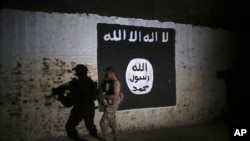Officials in Iraq say Islamic State (IS) fighters killed all seven members of a family in northern Salahuddin province on Friday, promoting widespread shock and anger among locals.
The outraged relatives of the victims refused to bury the remains until they would get answers from the country’s top leadership over what they called “continued security breaches” in the predominately Sunni area.
Multiple Iraqi officials, including the province’s governor Ammar al-Jabr, published a statement confirming the killings happened at dawn in Albu Dor village south of Salahuddin.
“We condemn in the strongest possible terms the cowardly attack,” al-Jabr said in the statement, “which resulted in the death of seven people, including women. And we confirm that the security services are fully investigating the circumstances surrounding the incident.”
IS claims responsibly
Shortly after the killings, IS claimed responsibly for killing six family members, calling them “spies” for the Iran-backed militias known collectively as the Popular Mobilization Forces (PMF). The extremist group made the announcement on its Telegram, a messaging platform it uses to spread propaganda. It also claimed responsibility for killing a police officer in the same area within the Salahuddin province north of Baghdad.
The village in Tikrit district is commonly known because it is also the birthplace of Iraq’s former president, Saddam Hussein. The area, experts say, is within “disputed territories” between the federal government and the Kurdistan Regional Government in the north. The tension between the two authorities has created a security gap making the area more conducive for the extremist groups to thrive, according to regional leadership.
“Armed men wearing masks and military uniforms were riding two cars, according to eyewitness accounts from the area,” Tikrit mayor Omar al-Shindah told Iraqi news site Shafaq.
A continuous threat
The attack indicates how the terror group continues to pose a deadly threat to civilians in the country, even though it no longer controls territory.
The assault also comes days after the head of the Catholic Church, Pope Francis, paid a historic visit to Iraq and met with the country’s top leadership, including Grand Ayatollah Ali al-Sistani, Iraq’s most senior Shia cleric. It was widely considered a success since no major violent incidents broke out during the Pope’s four-day visit.
Call for 'local force'
Some Iraqis immediately blamed the Shiite-led government in Baghdad for the attack, and said authorities failed to provide adequate protection for the Sunni areas. They called on federal authorities to help create a “local force” to oversee security in the surrounding area.
“The government is responsible for the series of crimes committed by these cowardly murderers,” said Qutaiba al-Jubouri, an Iraqi lawmaker from Salahuddin in a statement. “Because they did not act after the Al-Farhatiya massacre and did not reveal the perpetrators.”
Al-Jubouri is referring to an incident last October in Al-Farhatiya, Salahuddin village, where 12 people were killed during a mass shooting. Asa'ib Ahl al-Haq or the Khazali Network, an Iran-backed Iraqi Shi'a militia, is said to be the primary suspect for carrying the attack, according to local officials.
Shortly after the Friday attack, Iraqi Prime Minister Mustafa al-Kadhimi ordered an investigation into the killings. The findings of that inquiry, however, have not yet been made public.




